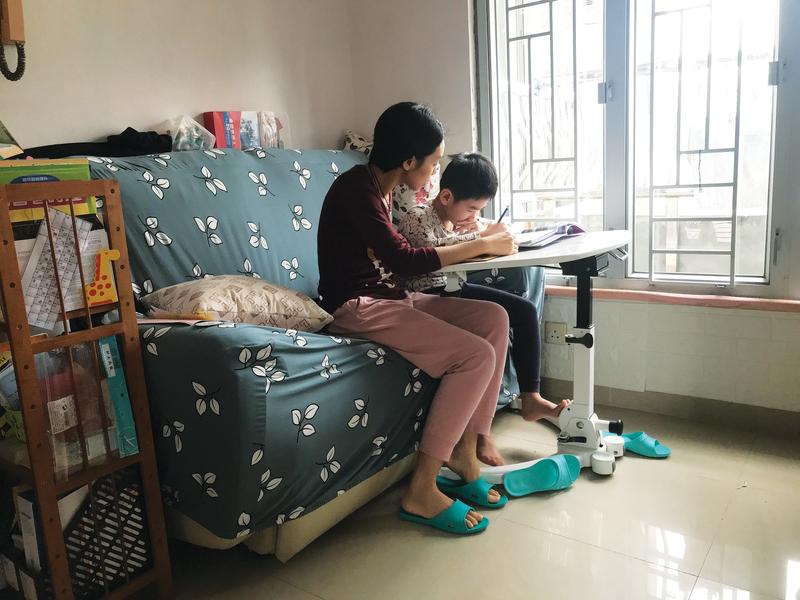 Zoe Zou tutors her son in their apartment in Tsuen Wan on Thursday. (PHOTO PROVIDED TO CHINA DAILY)
Zoe Zou tutors her son in their apartment in Tsuen Wan on Thursday. (PHOTO PROVIDED TO CHINA DAILY)
Amid the novel coronavirus outbreak, Hong Kong’s nearly 700,000 elementary and secondary school students have a big challenge — learning at home while schools remain closed. It’s a test of skill and determination. In the midst of the scare, parents and teachers are going through similar tests.
Gilbert Ching, a second-grader at an elementary school in Tsuen Wan, has been taking classes at home since the beginning of February. He cannot go back to his classroom until April 20 at the earliest.
From Monday through Friday, he logs on to an online platform where his teachers have uploaded instruction videos and homework assignments. For a math class last week, there were two parts — a 25-minute video about subtraction, followed by a 35-minute section to finish 22 exercises.
Ching said he is happy learning at home. “No more teacher scolding me for being absent-minded, and I can decide which class to take first,” said the 8-year-old.
His enthusiasm is not shared by his mother, Zoe Zou. She’s a stay-at-home mother who has been handed another job on top of her regular household chores. She’s now a teacher. When Secretary for Education Kevin Yeung Yun-hung announced the suspension of classes, he called on parents to enhance home-school cooperation and take proper care of their children.
Time for studying has been reduced significantly. Ching used to spend eight hours a day in school. Now school time has been reduced to less than two hours daily. In those two hours, Zou instructs her son in Chinese, English, math, general studies, music, and so on, with online materials provided by the school.
“It is not easy to teach, even though what you are teaching is just as simple as ‘1 plus 1’. I don’t get the way how I can plant the knowledge in my son’s head,” she said, frowning.
In a survey released on Wednesday, the Education University of Hong Kong (EdU) polled 6,702 parents of preschool and primary school students, and found 80 percent of the parents of primary school students had witnessed difficulties among their children when studying online.
Zou admitted yelling at Ching when the boy was not paying attention. “The relationship has gone tense. Sometimes, it is like a duel of trapped beasts,” she said.
To further strain Zou’s nerves, her son’s real head teacher cannot be reached. She sent a message asking details about a piece of homework on Feb 28, but received no reply.
The head teacher contacts her once a week, commenting on Ching’s homework and asking about any difficulties.
“I don’t think the teachers have followed up students closely. I worry about the final exam. I think he will perform poorly,” Zou said.
The EdU survey shows that almost 50 percent of parents of primary school students were not satisfied with the online learning arrangements, citing a “lack of support from schools and insufficient communication between teachers and parents”.
Nicole Wong, an English teacher at Ta Ku Ling Ling Ying Public School, agreed that home-schooling is a “demanding” task for most parents, especially when their kids are in primary schools.
“On top of taking care of the kids’ daily life, they now have to play multiple roles — a teacher, sometimes a technician to fix technology problems, and a counsellor to deal with emotional needs. It is hard,” Wong said.
The primary teacher disagreed with the perception that the absence of classroom time has made life easier for her. “It is a big challenge for teachers as well,” she said.
Wong has 28 students, among them 16 cross-border students now on the mainland. Her work begins as early as 6 am and finishes as late as 12 am.
Besides preparing teaching plans, emailing materials, and grading homework, Wong spends a lot of time calling each of her students to see if they followed her teaching.
“My phone beeps all day. Parents need us,” Wong said.
Jacqueline Hui, Chinese teacher from the Church of Christ in China Ming Kei College, shares Wong’s assessment. Hui struggles with the technology she needs to put her lessons online.
“It is like you are caught off-guard and sent to the front line immediately,” Hui said.
On the Education Bureau’s website, there is guidance for conducting online teaching, including documents, videos and recommended websites. “The assistance is abundant. But the time for getting prepared is what matters,” Hui noted. She was told to do online teaching at the end of January with her first online class set for early February.
She was brave enough to try live-streaming lessons to her Form 4 and Form 5 students. It marked the first time in her career, while most of her colleagues choose to make videos instead. She said she wants to be able to interact with her students to make sure her teaching is getting the message across.
She still hasn’t solved one big problem: She doesn’t know how to record the live sessions. “I want to record it so that I can give it to those who didn’t show up. I don’t want any of my students to miss classes. But I have no clue how to do so, even though I’ve tried many times,” Hui said.
Learning at home goes on, at least until the end of the Easter holiday. To Ching, it is a piece of good news. He shows no sign of missing school at all. Zou, on the other hand, eagerly awaits her son’s return to school even if it means classes during the usual summer break. She’s looking forward to getting her life back to normal.


